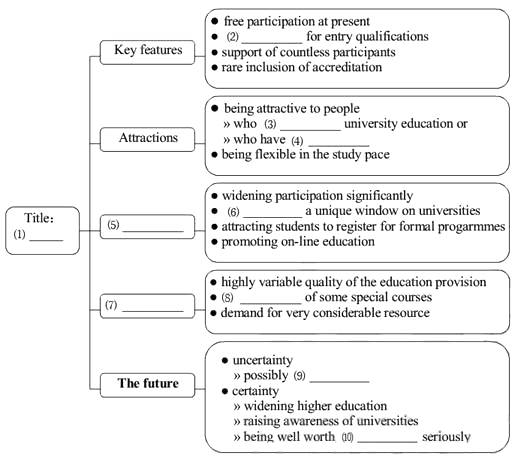题型:任务型阅读 题类:真题 难易度:困难
2013年高考英语真题试卷(湖南卷)
Currently offered by some famous universities, MOOCs are attractive to people who do not have the financial resources to meet the growing costs of university education, or who do not have formal qualifications. They also allow participants to study at their own pace.
The potential for MOOCs to deliver education is obviously vast—they could be considered as a huge step forwards in widening participation. They also have the potential to provide a unique window on universities that offer popular and valuable courses, they may attract some participants to register for formal fee-paying programmes at the same or other universities and are likely to promote new ways of on-line education.
However, it is still very early days for MOOCs. The quality of the education provision is highly variable, with many courses offering only recordings of lectures, and delivery is particularly difficult in some special fields that require practical classes, research projects or extensive library access. Besides, wider engagement with participants requires very considerable resource. Even limited feedback or examination becomes a major task if there are several thousand students in the class.
Considering the challenges, some people argue MOOCs will soon evaporate (蒸发). But they certainly provide good opportunity for widening higher education, are a means of raising awareness of universities to audiences of tens or hundreds of thousands, and are well worthy of serious consideration.

Let's face it: homework can be almost as frustrating for parents as it is for kids. Getting kids to do their homework can be a challenge, and when they do sit down to study, a variety of other problems can appear.
Doing homework may not be as fun as playing video games or chatting with friends, but it shouldn't be something that kids hate. Your children's assignments should not be busywork, but should help them build a skill or learn something new.
You can offer help by stepping in to answer questions or offer encouragement. This gives you a chance to see what they are learning and how well they understand the material. It helps you understand their learning style and shows you care about their education.
Many kids refuse to study by asking why they have to learn things they'll never use in real life. If your son or daughter shows little interest in their assignments, you can make them seem more important by pointing out ways you use them in daily life.
Parents who feel that their kids have too much homework can talk about it with the teachers, but they're in the minority. A 2007 survey showed that 15 percent of parents said their kids had too much homework. About 60 percent said the homework load was just right, and 25 percent thought their children had too little homework.
If you think it takes your child too long to finish homework, try to determine whether the problem lies in having too much work or managing time poorly. One of the things homework is supposed to do is to teach time management.
If your child feels bored while doing homework, consider the following suggestions to make study sessions more enjoyable.
Get help from friends: if your children are struggling with an assignment, let them call a friend for help or invite a friend over to work on it with them. You might also invite neighborhood kids over and let them do homework together. Have them sit around the dining table and help each other.
Add physical activities: set mini-goals for homework and allow time for stretching, jumping around, or a snack after each goal is completed. For a kid who can't sit still, find active ways to study.
Turn the tables: let your children teach you a lesson. Let them give you a quiz on the things they have just learned.
Title: Help with your child's homework | ||
The right goal of doing homework | It is supposed to help your child{#blank#}1{#/blank#}a skill or learn new things | |
Advantages of offering help | ◆You can see how things are going with your child's studies. ◆You can see what your child's learning style is like. ◆You can show you are {#blank#}2{#/blank#}in your child's education. | |
{#blank#}3{#/blank#}that you may face | The child's thinking that the assignments are{#blank#}4{#/blank#} | Tell them how you use the knowledge in real life. |
Your thinking that your child has too much homework | {#blank#}5{#/blank#}the problem with the teachers. | |
Your thinking that the assignments{#blank#}6{#/blank#}your child too much time | Find out whether there are problems with your child's time {#blank#}7{#/blank#}. | |
The child's thinking doing homework is{#blank#}8{#/blank#} | ◆{#blank#}9{#/blank#}to a friend for help. ◆Set small goals for the assignments and allow the child to do physical{#blank#}10{#/blank#}during breaks. ◆Let the child teach you something. | |
试题篮